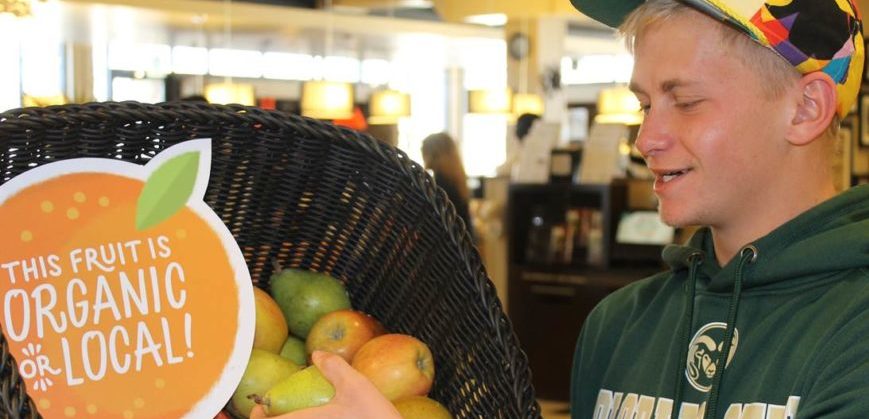Whole fruit in dining centers adds to sustainability success
by Sylvia Cranmer | March 8, 2017 2:02 PM

Sustainability efforts through Housing & Dining Services have seen tremendous growth in recent years due to the combined efforts of all areas within HDS. These efforts have included food waste diversion, composting, campus-grown lettuce, electric vehicle usage, recycling and use of solar arrays, to name a few. Through these initiatives, HDS has been able to reduce energy consumption, solid waste, and use of fossil fuels across all of our HDS facilities, as well as contributing to the overall green impacts across campus.
Residential Dining Services is doing its share to contribute to campus sustainability with minimal impact to the cost of meals. Starting in the spring semester, RDS began an “organic hand fruit” pilot program to change their whole fruit offerings. Now, all whole fruit served in RDS facilities is organic and/or locally sourced.
While we are all looking at ways to increase our fruit and vegetable consumption, it’s good to know that sustainable, organic and local options are available in campus dining centers. The organic attribute helps contribute to healthier eating with a reduction in pesticides and preservatives. Additionally, locally sourced food is typically fresher, better tasting and seasonally harvested.
The Dirty Dozen
Fruits and vegetables are important for your health, but certain varieties are best to buy organic if you want to avoid pesticides on your food. The Environmental Working Group (EWG) analyzed pesticide residue testing data from the U.S. Department of Agriculture and Food and Drug Administration to come up with rankings for popular fresh produce items. For a complete list of the 2016 “Dirty Dozen” and the “Clean Fifteen” visit the EWG website. [1]
Students driving force
Students have been the driving force behind this initiative on the CSU campus. The Eco Leaders (peer educators in the residence halls and Aggie Village Apartments) brainstormed ways to increase sustainability efforts within RDS, and according to RDS staff, this has also been a consistent request from students and families on surveys, at student resource fairs and from incoming and returning students.
This “organic hand fruit” program, which includes education, marketing and signage communicating the benefits, is currently being piloted for the spring semester. Its viability will be determined once students and staff provide feedback to evaluate the program.
The dining centers are currently serving locally grown/organic apples, as well as organic oranges, bananas and seasonal options. Locally sourced apples will continue to be served as long as the supply is available from suppliers. When local products are no longer a seasonal option, the supply will default to organic until the growing season cycles around again.
National trend
CSU is not alone in this effort. Many colleges and universities around the U.S. are working to provide students with healthy, sustainable meal options – primarily by investing in local agriculture by serving locally sourced food in their dining centers. According to the National Association of College & University Food Services (NACUFS), practicing sustainable operations not only benefits the environment, it helps collegiate dining departments foster positive relationships with academic and administrative departments, students, and other constituencies.
- the EWG website. : https://www.ewg.org/foodnews/dirty-dozen.php
Source URL: https://source.colostate.edu/whole-fruit-dining-centers-adds-sustainability-success/
Copyright ©2024 SOURCE unless otherwise noted.